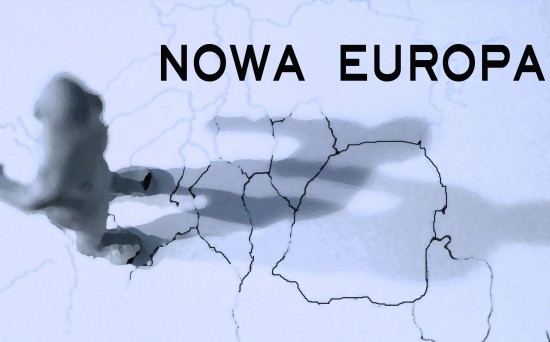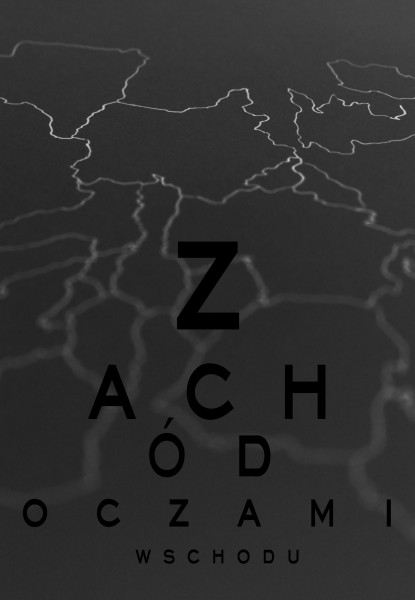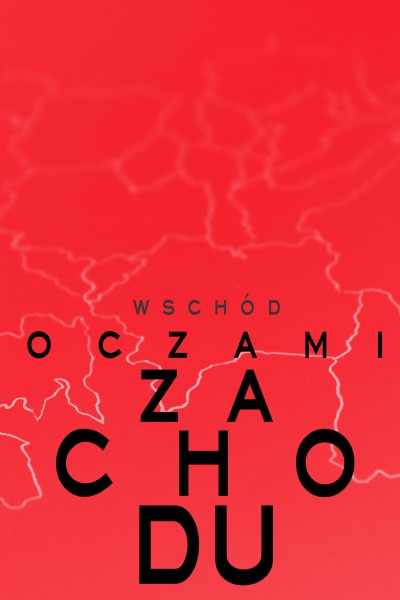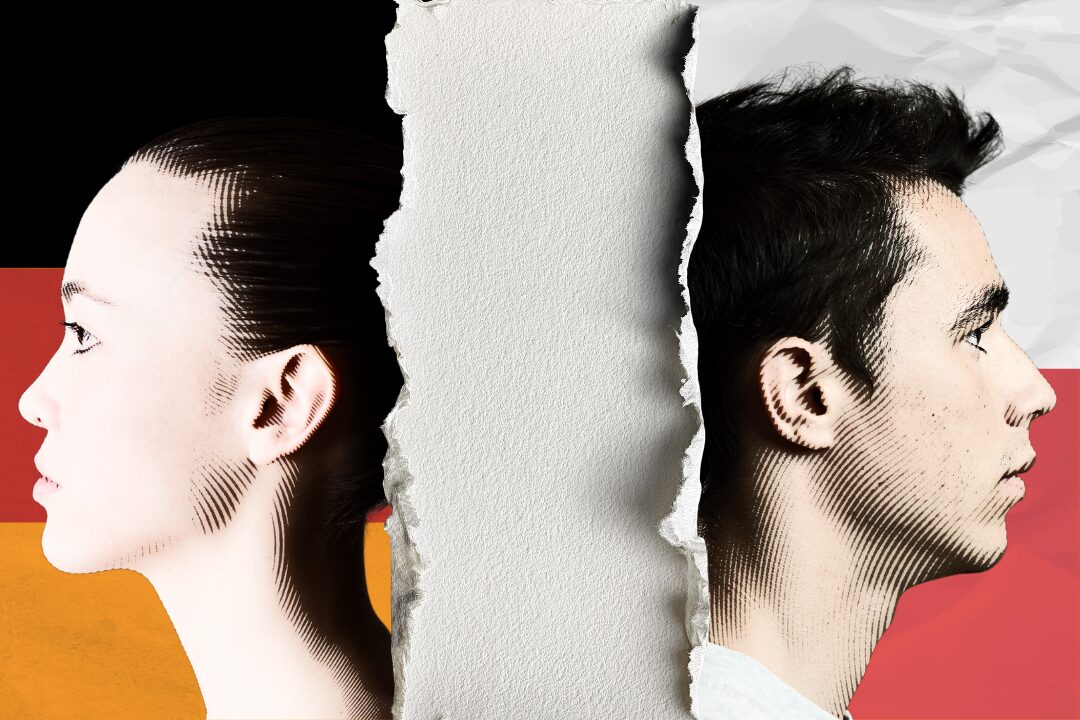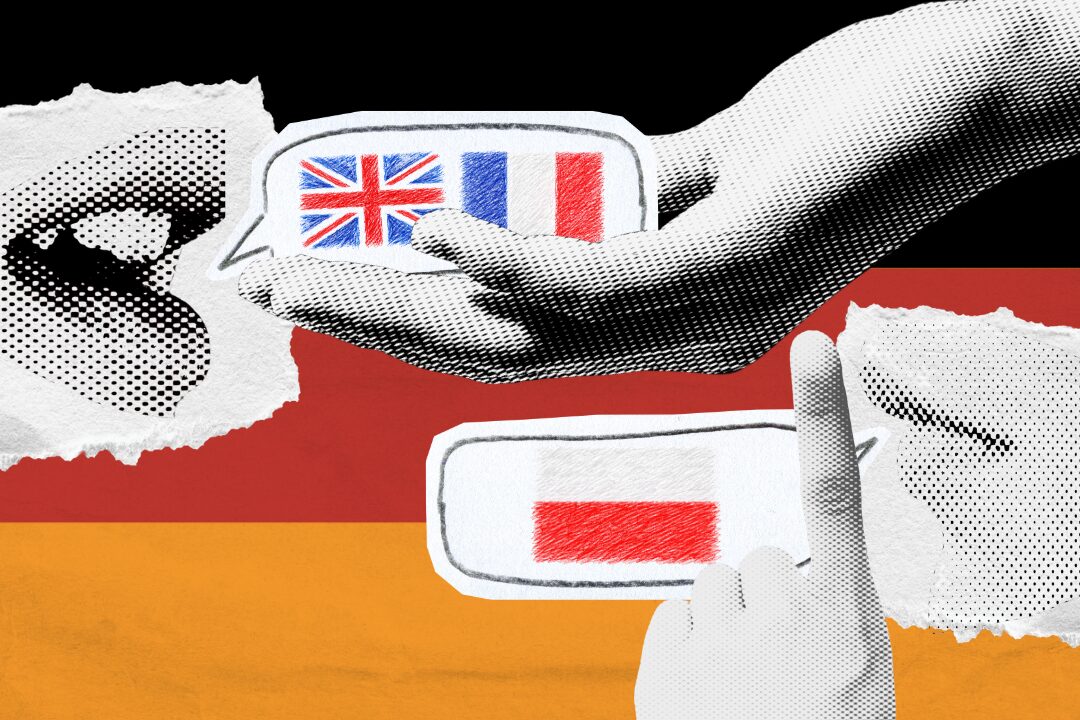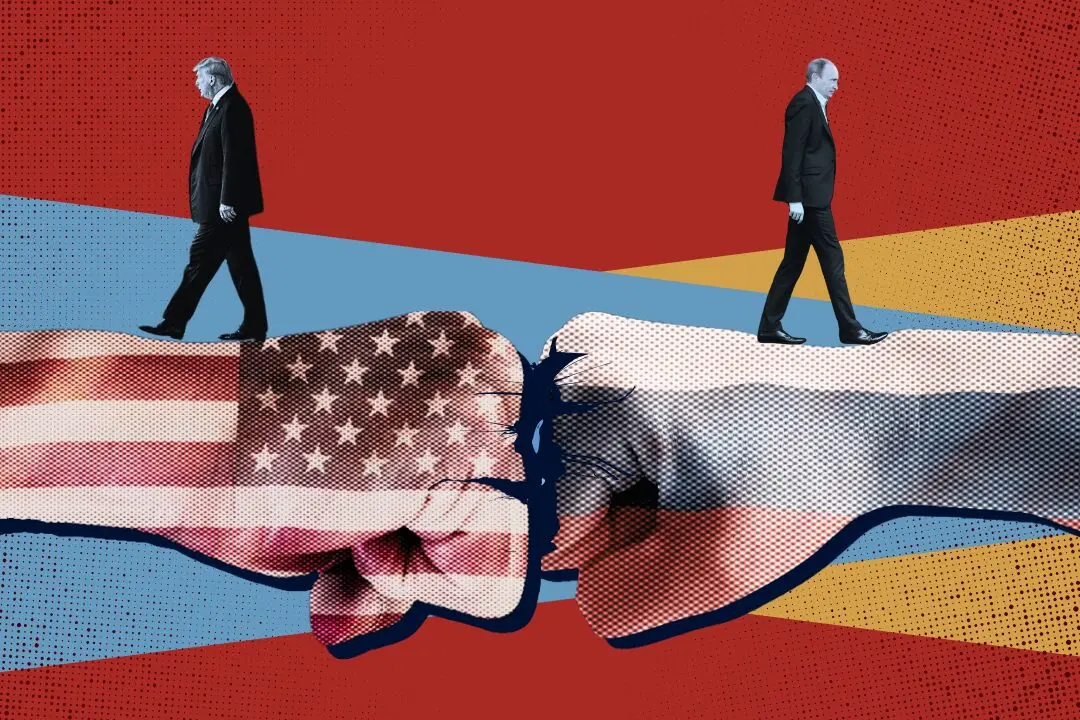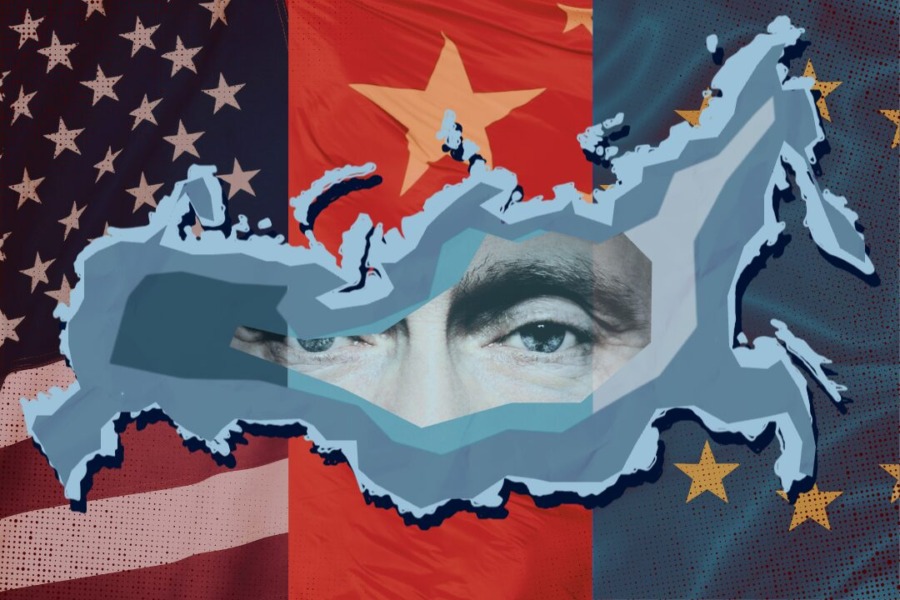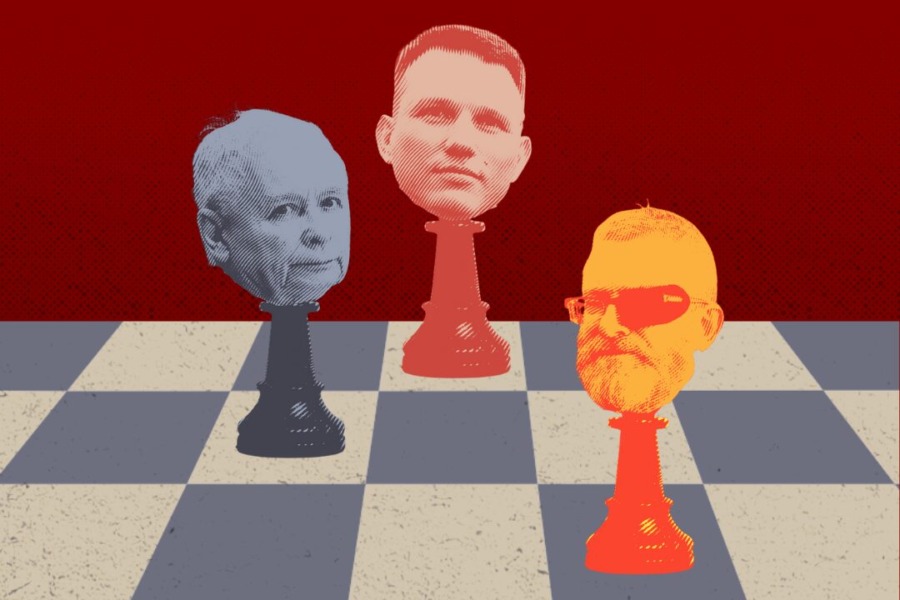[Wersja polska/Polish version]
Dear Readers,

European Union has secured for its citizens peace unknown to previous generations. Nevertheless, maybe the Polish writer was right, claiming we can no longer talk about being the centre of the world. Yet still, differentiation between the centre and the periphery is still important in political theory, economics and other social sciences, even if it lost its old meaning in regard to the European Union. Poles, who tend to think about themselves as being the ‘bulwark of Western civilization’ and ‘poorer cousins’ of the Western Europe, seem not to have noticed that ‘the centre’ had effectively evaporated.
Difficulties with finding the centre of the united continent, helps us to reconsider our own understanding of Europe. Geographically speaking, it is a little German town Gelnhausen near Frankfurt am Mainz. The political and economic centre of the continent is not so easy to establish, though. Should we look for it in Brussels, Strasbourg, Frankfurt, Paris, London, or perhaps in Berlin? If it is so difficult to find the modern umbilicus Europae, it is even more challenging to point out European peripheries. Traditional concept of locating them eastwards from the Elbe or Oder makes no sense any more. The socialist experience has lesser and lesser impact on the new generations of the Central and Eastern Europeans, while modern political and economic challenges have widen the gap between different countries of the old Soviet bloc. Is there really much in common between the well-prospering euro-zone member, like Estonia, and the debt-ridden, politically isolated Hungarian state? How many people remember that the ‘western’ Vienna is in fact further east than the ‘eastern’ Prague?
Faced with the current economic crisis, the conventional split between the East and the West can be doubted as well. Many countries of the “new Europe” deal with the crisis much more effectively than their partners from western or southern fringes of the continent. Let’s try to use some more real-life measure: in 2013, young Greeks have much worse perspectives for an affluent and stable life than their Polish, Czech or Slovenian friends. Greek economist George Pagoulatos confirms this opinion in the newest ‘Kultura Liberalna.’ Asked about young Greeks being a ‘lost generation’, Pagoulatos writes: ‘If we fail to introduce reforms quickly, a large part of the whole society will effectively become a lost generation.’
Perhaps then the European periphery should be rather found in the ‘poor South,’ which can be contrasted with a dynamic and well-off North? This division does not work either. Regardless of their serious problems, Italy or Spain cannot be called ‘provincial,’ if only because of the sheer size of their economies. José Ignacio Torreblanca, in his conversation with Łukasz Pawłowski, emphasizes that the Spaniards have not lost faith in the united Europe, despite the severe times they are going through. ‘We see the rise of mistrust towards Brussels and EU institutions but not the European Union as a whole’, Torreblanca explains.
Even more confusing is the fact that the infamous group of PIIGS includes Ireland, which belongs of course to the northern part of the continent. Moreover, where should we place the United Kingdom, which is still economically strong, but at the same time is visibly distancing itself from the European centre for various political and cultural reasons? ‘The most important thing to understand about the United Kingdom is that most people don’t care about the European Union’ says Sir Robert Cooper in an interview with ‘Kultura Liberalna.’ On the other hand, Sir Cooper points to the fact that the British political class, and the Conservative Party in particular, has a true obsession about the rivalry between London and Brussels. But can we say that Brussels will become a symbolic centre of Europe? It hardly seems possible.
The South-Eastern part of the continent presents us with yet another problem. Although countries like Bulgaria, Romania or Hungary are not among the strongest economies, especially during the crisis, the popularity of the EU is still at relatively high levels. The obstacles blocking a faster growth are to be found in weaker institutions, current economic distress and growing ethnic tensions. These are all pointed by John Shattuck, especially in the case of Hungary.
Finally, how should we see the position of Croatia, the newest member of the club? Even though the government in Zagreb has sacrificed much during the negotiation process, Maciej Falski shows in his article for ‘Kultura Liberalna’ that social acceptance for these decisions is rather week.
Where then the European peripheries are to be found? Our analysis leaves hardly any doubts – in a sense, all contemporary Europeans live in peripheries. It seems Stempowski was right after all.
We hope you enjoy your reading!
Łukasz Pawłowski
*PIIGS – an acronym of countries most seriously hurt by the crisis: Portugal, Italy, Ireland, Greece and Spain.
1.ROBERT COOPER: Leaving the EU would be a political and economic disaster
2. JOSÉ IGNACIO TORREBLANCA: Who does what and who is in charge?
3. JOHN SHATTUCK: European integration must not be reversed
4.GEORGE PAGOULATOS: Common Europe at any cost
5. MACIEJ FALSKI: Goos EU and bad citizens. Around the Croatian accession
Leaving the EU would be a political and economic disaster
“If the United Kingdom ever decided to leave the European Union, then Scotland would almost certainly leave the UK – they would not like to be left alone with the English”, says Robert Cooper in an interview with Łukasz Pawłowski
Łukasz Pawłowski: Does still a majority of Britons want to leave the European Union as some opinion polls back in November suggested?
Robert Cooper*: The most important thing to understand about the United Kingdom is that most people don’t care about the European Union. The issues they care about are jobs, prices, health, education, crime, sometimes immigration. They associate these issues with Westminster, not with Brussels. If you ask them whether they like the EU, they will probably say they don’t. But then why should they? All they see is the mess created by the euro, endless summit meetings making empty declarations about growth, stability and jobs. But they don’t like the British government much either. That’s all normal.
Then why are the UK-EU relations so often discussed in British politics?
Because the political class, the Conservative Party is obsessed with the EU. I won’t try to explain why because I don’t understand them and I would probably not do them justice if I tried. Conservative party members are about 0.25% of the population; so normally that wouldn’t matter much, but at the moment they are in power so you have to take them seriously. The present government can’t decide whether the economic crisis is the fault of the last Labour government or of the EU. They have forgotten about the mess the banks made, and the regulators, both in Europe and in the United States.
What expectations, then, do Britons have towards the EU?
Very low. Most people don’t know what it does. It is wrong though to ask these questions about British people. You would get more positive responses in Scotland.
And this is quite paradoxical, because on the one hand you say Europe is not a very engaging issue for Britons but on the other, it seems be a very divisive one if you consider the differences between the Scots and the English.
You are right, euroscepticism is most prevalent in England. As you know, next year we will have a referendum on Scottish independence. One of the issues that discourage Scots from voting for independence is the question of whether membership in the European Union for an independent Scotland would be automatic or whether it would have to be negotiated. Scottish National Party which campaigns for independence has been making a great effort to persuade the Scots they will not lose their membership in the EU if they leave the UK. However, if the United Kingdom ever decided to leave the European Union, then Scotland would almost certainly leave the UK – they would not like to be left alone with the English.
Where does this difference between the English and the Scots come from?
I’m not sure at all. Except that there is a history of strong connections between Scotland and the Continent. It may seem ridiculous as it all happened in the past centuries, yet if one looks at the wars England fought against France, quite frequently there were many Scottish people in French armies. The army of Joan d’Arc contained more Scottish than French – they acted according to the rule that the enemy of your enemy is your friend. Why this should make any difference today – I have no idea. Nonetheless, the connections between Scotland and Europe go back long way.
So the government in London may be forced to stay within the EU in order not to risk any serious complication of its relations with Scotland?
* Sir Robert Cooper, is a British diplomat. He has worked at various British embassies abroad, notably those in Tokyo and Bonn and was an advisor to Javier Solana, the former High Representative of the EU’s Common Foreign and Security Policy. He is currently serving as a Counsellor in the European External Action Service. He is also a member of the European Council on Foreign Relations (ECFR).
** Łukasz Pawłowski is a journalist, regular contributor and managing editor at “Kultura Liberalna”.
***
Who does what and who is in charge?
“Europe has become somewhat alike the markets – who are they? We don’t know. They are acting and we experience the consequences of their actions, yet have no influence over them”, says José Ignacio Torreblanca in an interview with Łukasz Pawłowski
Łukasz Pawłowski: What is the current attitude Spanish people hold towards Brussels? In your analysis published at the beginning of 2013 you wrote: “There is a widespread feeling that, for all the pain Spain is going through, the rest of Europe is failing to deliver on its side of the bargain that is necessary to deal with the crisis”. You also mentioned some poll results according to which almost 60 percent of Spaniards believed being within the euro zone has been negative for Spain. How has the mood changed over the last few months?
José Ignacio Torreblanca: Despite these results I believe Spaniards still have a positive attitude towards the European integration and you can see that in some other poll results. What they question, however, is how this particular crisis is being dealt with and what role some European institutions and countries play in the process. It is still a minority that would like to see Spain leave the EU. Nonetheless, for the first time Spaniards have become very critical about how Brussels is handling things. It is quite remarkable because the European integration has always been a subject of a wide consensus between right and left, centre and periphery. We see the rise of mistrust towards Brussels and EU institutions but not the European Union as a whole. People distinguish between the project and the way it is being managed.
So Spaniards still have the faith in the European Union as an ideal but are disillusioned with the political class that is supposed to realize it?
In the past Europe was associated with necessary and beneficial reforms. Now there is a widespread feeling that it began to interfere too much in domestic politics. It entered all the spheres that were traditionally left to local elites and is imposing severe health, pensions, and education cuts. These adjustments should be implemented by national politicians, not European commissioners, who are not elected and have almost no democratic legitimacy.
Who is therefore to blame for the current state of the Spanish economy? Is it the European Union which failed to create proper institutional supervision or Spanish political class which – thanks to cheap credit – kept on borrowing money without reforming the country?
Obviously not all Spaniards are economy graduates and cannot determine who is actually to blame, but they see that European institutions are not working. The United States may have generated the crisis but the country is effectively out of the woods, whereas institutional confusion within the EU – due to which nobody knows who does what and who is in charge – makes governance very chaotic. The predictions about growth upon which the EU commissionaire based his decisions have repeatedly proven wrong, but no one seem to be responsible. Europe has become somewhat alike the markets – who are they? We don’t know. They are acting and we experience the consequences of their actions, yet have no influence over them.
What kind of reforms do you think should follow from this diagnosis – ongoing centralization of the EU somehow combined with democratization of its institutions?
* José Ignacio Torreblanca is a Senior Research Fellow at the European Council on Foreign Relations and the Head of its Madrid Office.
** Łukasz Pawłowski is a journalist, regular contributor and managing editor at “Kultura Liberalna”.
***
John Shattuck
European integration must not be reversed
As an American, but one very familiar with Central and Eastern Europe, I believe an integrated Europe is extremely important for several reasons. First of all, it is important for maintaining peace and stability and thus for overcoming the terrible legacies of the Second World War, so devastating to Europe and the rest of the world. Secondly, the European Union plays a crucial role in creating economic opportunities for its members. The current crisis should not make us forget how prosperous Europe is and can still be. Thirdly, European integration might be a driving force behind a process of creating a broader sense of political identity. Europeans have many different cultures and nationalities and there is a need to bring them together, so that they have some shared sense of community. Any European project has to take this into account, while creating a democratic framework for people to cultivate their own national identity at the local level.
The process of European integration has gone through a number of changes since the early 1990s. Some of them were encouraging and some problematic. The first dramatic change occurred right after 1989, when the long-lasting Soviet domination over a large part of the continent collapsed and many nations suddenly had to reinvent their states, drawing upon their own democratic traditions. In Poland or Czechoslovakia, as it then was, i.e. countries with some experience and strong feelings for democracy, this transformation proceeded from a good base. In other states it was less clear on what traditions new institutions should be built. In Hungary, where I now live, there were weaker democratic and stronger authoritarian traditions, dating back to the Habsburg era. This was even more the case in Romania, Bulgaria and other countries in the Central and Eastern Europe. These were the initial challenges, as they developed in the 1990s.
At that time there were two major steps that Central and Eastern European countries took to develop their democratic traditions. The first one was the NATO accession. Joining the alliance which had been at the center of the Cold War, and which was committed to the defense of democracy, was a very important moment for them. Being admitted to the group meant becoming a member of the democratic community. The EU accession – the second of the steps – was more complicated, but perhaps even more important. Undoubtedly it created more excitement among the public, because of some practical advantages of participating in the common market and being able to travel within the Schengen zone.
Ten years after the accession, we clearly see that some expectations of the public have not been met. Why? Firstly, there was a structural problem from the very outset. The European Union was designed largely as an economic project and it failed to create effective instruments of political participation for the public. Centralization of the European bureaucracy in Brussels and the development of a highly structured regulatory governance system created a growing frustration among the Central European societies, and indeed among other European peoples as well. A democracy deficit at the highest levels is one of the major problems the EU needs to tackle in order to develop. It has been partially addressed by the growing political influence of the European Parliament, which has become a more active player in representing opinions of the European electorate. But I think there is still a lot to be done in order to give people a sense of participation. Otherwise, they will look only to their national governments, exacerbating the tension between Brussels and the member states.
The second big factor undermining trust in the European Union has been the economic meltdown. The way the euro crisis has been managed so far seems to prove that southern and eastern regions of the EU are treated as secondary areas by the central economies of Germany, the Benelux area and France. Economic instability has also created further tensions, since people affected by crisis often look for scapegoats, in this case immigrants and ethnic minorities. As a result, in many European countries xenophobic and racist sentiments are on the rise. Anti-immigrant, anti-Roma perspective that you see in Europe today is very disturbing. These are pan-European phenomena, not specific to the Central and Eastern Europe. Naturally, different politicians in different countries are using these processes to foster their own interests. This is particularly true in Hungary, but in other countries as well.
Will these two factors undermine the process of European integration? We should do all we can to prevent it. European integration is of crucial importance for reasons of peace, stability, economic prosperity and democratic rule across the whole continent. This is even more true today than ever. As the world’s greatest experiment in transnational cooperation, the EU should continue to broaden its membership base, while at the same time taking steps to overcome its democratic deficit. That is why I was pleased to see Croatia becoming a member, and I think it is of crucial importance to bring in other Balkan countries. Dynamic European integration, even if it has serious problems today, should continue and must not be reversed.
* John Shattuck is an American legal scholar and diplomat. He was the Assistant Secretary of State for Democracy, Human Rights and Labor from 1993 to 1998, under President Bill Clinton. From 1998 to 2000 he served as the U.S. Ambassador to the Czech Republic. Since 2009 he has been the President and Rector of Central European University (CEU) in Budapest.
***
George Pagoulatos
Common Europe at any cost
It would be difficult to find a single family in Greece, which has not been affected by the crisis. Salaries and pensions have fallen by up to 40 %, and taxes have increased on an unprecedented scale. Thousands of companies went bankrupt, thousands of jobs have disappeared. The young and the poor are suffering the most. Those who are unemployed for over a year cannot count on any benefits. People in this situation often fall below the poverty line.
Does it mean that young Greeks are already a lost generation? If we fail to introduce reforms quickly, a large part of the whole society will effectively become a lost generation. The young people may turn their backs on the European Union with a feeling that they were betrayed by the European system. Long-term unemployment is a threat to democratic stability and we have to stop it. Meanwhile, however, youth unemployment rate already reaches 60 %.
Germany, the leader of the EU
Who is responsible for the Greek crisis? It is difficult to identify a single culprit. First of all, the responsibility lies with Greek politicians who allowed the country to fall into debt and to lose competitiveness. Secondly, the Greek citizens are to blame for not demanding reforms. Thirdly, it is also a fault of the European Union,which failed to create the necessary institutions in time. Institutions capable of preventing the euro zone crisis.
The Greeks have always been very pro-European. We wanted a deeper integration – and we still want it. We expect fiscal, economic and political reforms of the EU, which will bring all the members closer together. The country I expect to move Europe towards these reforms, is Germany. The largest EU economies should assume the role that comes with their dominant position. The truth is that we should be more afraid of German impotence than of their leadership and strength. I agree on this matter with the Polish foreign minister. However, in Greece, as in Poland, you can still find people, who perceive Germany and other nations through some historical atavisms.
Greek nationalists
Populism is a serious threat in present day Greece. The crisis helped the extremist parties on both left and right side of the political scene gain some social support. The right-wing populism seems to be the most dangerous – they are neo-nazis, racists and nationalists. They hate foreigners, especially immigrants, and built their popularity on anti-immigration sentiment. Another wave of unemployment may bring a new wave of populism. The radical right uses the economic crisis for their own advantage, but I hope that they will disappear as soon as the Greek economy improves.
Reforms are the price for remaining in the EU
Despite the phenomenaas extreme as the neo-nazi party, the Greeks remain pro-European. Seven out of ten Greeks support the euro and so do all major parties in the Greek parliament. Greece will certainly not get out of the European Union. We would not be going through all these painful reforms, if we were to leave the euro zone! We accept enormous socio-economic costs to remain at the heart of the European integration.
We need the European Union. The EU is a common good: it gives us open markets and open societies, beneficial international institutions, a higher level of protection of civil and social rights. It is the most noble idea we came up with in the 20th century Europe. It grew out of the ashes of World War II, out of the experience of two world wars on the continent. This ideal, this project, must be continued, almost at any cost. But for this to happen, we need to show that it is a successful venture, that in the future it may re-assure prosperity, stability and solidarity – give us the impression that we are a part of a single project, a part of a unity which is the common Europe.
* George Pagoulatos is a professor of European politics and economics at the Athens University of Economics and Business. In the years 2011-2012, he worked as the director of strategic planning and senior adviser to Prime Minister Lucas Papademos.
***
Maciej Falski
Good EU and bad citizens. Around the Croatian accession
Everything was supposed to seem joyful and modern. On the eve of Croatia’s accession to European Union entertaining, trashy celebrations were organized in every town and county. People were supposed to have fun and gloriously welcome that special day in Croatia’s history. Many commentators have described the accession to the EU as the nation’s comeback to the Western community, a return to the proper political and cultural position and even as a final break with the Balkans and the ghosts of former Yugoslavia. Politicians of the ruling party left no doubt: Croatia doesn’t have a choice. Either the EU, development and stability, or chaos and permanent crisis. We have heard analogous arguments in Poland a few years earlier: the progressive, culturally advanced, entrepreneurial, young and educated supported Brussels, unlike their backward and low-life opponents. In Croatia, the government representatives expressed their views in a similar way, presenting the EU as an obvious choice.
However, people did not rush into support. Attendance at the pre-accession referendum was not high, and pro-Europeans received only a half percent over the obligatory majority of votes. Some say that the results were “fixed” by the government. A government minister is still being accused of having blackmailed retirees with a threat of cancelling their benefits in case the vote was lost. Still, as the case of Ireland has shown, voting can always be repeated until the desired result is finally achieved. On the eve of the accession the majority was enjoying the concert of Mark Perkovic Thompson who – as some have maliciously commented – expresses strongly anti-EU, nationalist-Catholic views. Interestingly enough, the Croatian youth was – along with the retirees and the veterans of the 1990’s wars – one of the social groups least supportive of the accession.
One has to honestly admit that the timing is terrible. It’s just enough to mention the Greek crisis, the deplorable state of Spanish and Portuguese economies, the reticent position of London. However, Croatian reluctance towards the EU has also another reason. Brussels has blackmailed Croatia for a few years, insisting on cooperation with the International Criminal Tribunal in the Hague. This concerned giving away general Ante Gotovina. The accession negotiations had reached a standstill and moved forward only after general was handed in. For the majority of Croats Gotovina is a symbol of the country’s victory and of recovering full independence in 1995. His conviction was regarded as questioning the very independence of the state and its freedom that was so difficult to win. Paradoxically, the general was cleared of all charges and released just after the referendum – as if in reward for the well-executed task. Such moves taint Brussels’ image even further, as they continue the series of mistakes and arrogant decisions that date back to the collapse of Yugoslavia.
Croats are also afraid of the brain drain. Although the majority of the labour markets remains closed to them (what about the principle guarantying free movement of people?), the educated Croats will find jobs abroad more easily, which would only reinforce current negative migration trends. The citizens are concerned about the prospect of economy’s dependence on Brussels, too, especially after the recent statements by the Minister of Finance, who announced his will to continue the privatization of what had been left and is still functioning well. Finally, there are fears of losing influence on political decision-making, even though this sort of freedom in contemporary world is for many governments only illusionary.
As in most countries, also in Croatia the European issues are dependent on domestic policy. This is where the growing gap between the politicians and citizens is best perceivable. The political class took on the role of all-knowing and all-powerful elite who knows best what is most beneficial for everyone. It presents its own interests as a common goal and the push towards the accession to the EU is a very good example of such behaviour. It’s been some time now since politicians started to haggle over who goes to Brussels and who to Strasbourg, who gets what position and what salary. In the meantime citizens are treated like in the old times, as a crowd without voice, “random people” according to the infamous saying of one of Polish politicians. If people do not vote the way the government wants – it’s not because they have other ideas and goals, but because they doesn’t know what is good for them. They behave foolishly. Meanwhile, politicians care about their positive image among other politicians, the European ones. Privatize, do not discuss, organize games.
Croatian road to the EU reveals a crisis of representative democracy, closely related to the fact the national political class is so dependent on Brussels. The unequal distribution of power is clearly visible from the peripheral perspective of Croatia. Citizens’ fear of colonization seems justified, since the government recognizes legitimate dialogue partners rather in other European politicians than their own compatriots. Europe definitely needs to redefine its public sphere, even more than it needs short-term economic reforms. A widespread belief that government is good whereas citizens are bad and narrow-minded, does not promise well for the future.
* dr Maciej Falski, employee at Instytut Slawistyki Zachodniej i Południowej of the University of Warsaw.
Translated from Polish by Tomasz Sawczuk
***
* The author of the concept for the Topic of the Week: Łukasz Pawłowski.
** Collaborators:Hubert Czyżewski, Emilia Kaczmarek, Tomasz Sawczuk, Ewa Serzysko.
*** Illustrator:Emilia Sieczka.
“Kultura Liberalna” no. 242 (35/2013) of August 27, 2013


